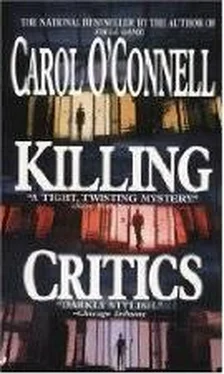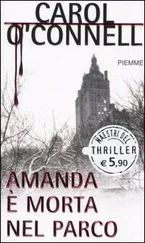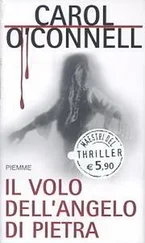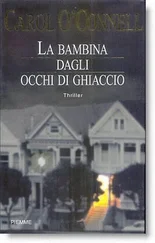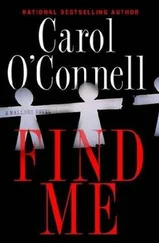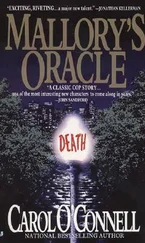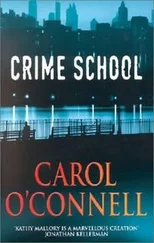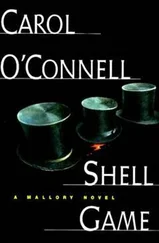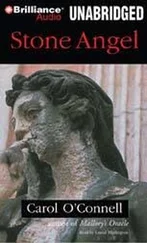Carol O’Connell - Killing Critics
Здесь есть возможность читать онлайн «Carol O’Connell - Killing Critics» весь текст электронной книги совершенно бесплатно (целиком полную версию без сокращений). В некоторых случаях можно слушать аудио, скачать через торрент в формате fb2 и присутствует краткое содержание. Жанр: Триллер, на английском языке. Описание произведения, (предисловие) а так же отзывы посетителей доступны на портале библиотеки ЛибКат.
- Название:Killing Critics
- Автор:
- Жанр:
- Год:неизвестен
- ISBN:нет данных
- Рейтинг книги:3 / 5. Голосов: 1
-
Избранное:Добавить в избранное
- Отзывы:
-
Ваша оценка:
- 60
- 1
- 2
- 3
- 4
- 5
Killing Critics: краткое содержание, описание и аннотация
Предлагаем к чтению аннотацию, описание, краткое содержание или предисловие (зависит от того, что написал сам автор книги «Killing Critics»). Если вы не нашли необходимую информацию о книге — напишите в комментариях, мы постараемся отыскать её.
Killing Critics — читать онлайн бесплатно полную книгу (весь текст) целиком
Ниже представлен текст книги, разбитый по страницам. Система сохранения места последней прочитанной страницы, позволяет с удобством читать онлайн бесплатно книгу «Killing Critics», без необходимости каждый раз заново искать на чём Вы остановились. Поставьте закладку, и сможете в любой момент перейти на страницу, на которой закончили чтение.
Интервал:
Закладка:
In a burst of intuition, the woman, who truly understood men, realized that this man’s entire life had been shaped by his eyes, which could not convey any semblance of humanity-only bullets and ice.
She forgot the pitch to sell her body. In silence, she stepped back and watched as he turned away from her and entered the Gulag. The restaurant’s glass door swung shut behind him.
The Gulag was brightly lit to obliterate any trace of ambiance which might induce the patrons to linger over their food. Eat and get out ! said the overhead fluorescent lights. The strong aroma of coffee dominated the single room, riding over the stale odors of bygone meals.
J. L. Quinn threaded his way through tables of tired conversations and the quiet islands of solitary book readers. A cockroach ran for its life across the cracked linoleum in advance of the man’s handmade shoes. Quinn sat down at his regular table, a small square of Formica in company with two plastic chairs.
Few people knew that he frequented this place. Those few had often pressed him with variations of “Why in God’s name would you eat in a hole like that?” The famed art critic always responded with high praise for the cheeseburgers. This from a man who had authored four books on fine art, whose suits were tailored by maestros, and whose moustache never trapped crumbs.
He glanced at his watch. Detective Sergeant Riker would be arriving soon. Riker’s urgent business could only be the recent murder of that hack artist-and this made him smile. The police department was so right to suspect an art critic. In his youth, Quinn had taken a postulant’s vow to kill off bad art before it could spread.
Near his table at the back of the room, a long countertop bore the ravages of the last shift of rush hour in the deserted dishes and crumpled napkins. The two men seated on counter stools were not regulars, and unlike the other patrons, they eyed him with grave suspicion. In unison, they bulked up their shoulders to make themselves larger than they were. By the warehouse logos on their T-shirts, Quinn guessed their vocations as manual labor, and in their expressions, he intuited avocations of mindless violence.
Out of habit, the art critic touched one finger to the scar above his moustache. The two customers abruptly ceased to ogle the man who smelled of money. They swiveled on the counter stools to turn their backs on him. Quinn flirted with the idea that his scar had the power of a talisman. This was the single fanciful thought in his otherwise pragmatic mind.
His regular waitress was standing at the next table, piling dirty dishes on a tray. She saw him now and walked to his table to take his order. He noted all the signs of the long day’s warfare in the food stains on her clothes. The blue-jean legs below the hem of her apron were stained with an artist’s rainbow of oil paints.
“I’m waiting for someone, Sandy. Will you give me a few minutes?”
“Whenever, Mr. Quinn.”
She was his type, attractive and intelligent, but she was a painter. He had never bedded an artist, though not for the lack of offers. A sense of ethics had always prevailed and prevented any forays into the art community. There were women enough elsewhere when he wanted one.
Sandy deposited a second menu on his table as she passed by with her tray artfully balanced on one arm. “For your friend,” she called back over her shoulder.
He glanced at the door. Detective Sergeant Riker had arrived.
Though more than a decade had passed since they last met, Quinn recognized the man’s slouching silhouette on the other side of the glass, which was too fogged with grime and scratches to allow for much more detail.
Sandy was already appraising Riker as he pushed through the door, and by the dip of her mouth on one side, the waitress judged him to be a bad tipper. Her eyes opened a little wider as the man with two days’ growth of beard walked to Quinn’s table and the art critic stood up to greet his guest.
At fifty-five, Riker was not much older than himself, but Quinn thought the detective wore his years less well, and certainly with less style. He would not have been surprised to learn that Riker was dressed in the same suit he had on twelve years ago when they had sat down to this same table to discuss a more personal murder.
As Riker shook hands with Quinn, there was a tone of apology in the rituals of “Hello” and “Good to see you again.” There was great regret in the detective’s brown eyes as he took his seat opposite the art critic.
One might believe Sergeant Riker’s suit had been slept in. Not true. The wrinkles were determined by the way the garments landed when tossed onto some piece of furniture or, missing that mark, the floor. And the network of red veins might mislead anyone who didn’t know how red his eyes could be when he was living in the bottle. This evening he was only showing the wear of a night without sleep, and the heavy reading of old case files.
“Thanks for seeing me on short notice, Mr. Quinn.” He noted the art critic’s tan, a side effect of having a summer home in the Hamptons. Quinn’s glowing good health and trim figure fit well with Riker’s idea that money could buy absolutely everything. Now he caught his own pasty, dregs-of-the-booze reflection in the mirror behind the counter, and he turned away.
“I assume your visit concerns the death of Dean Starr,” said Quinn in his cultured voice, which exuded breeding and a privileged education at the finest private schools on the eastern seaboard.
“Yes, sir, it does,” Riker said, with a rough New York accent that spoke of a night school education, paid for by blue-collar jobs. The policeman looked down at his hands. The left was scarred with a bullet wound, and the right still bore the marks of a felon’s teeth. He knew these hands could never, in one million years, touch the cool fair skin of the women Quinn was accustomed to.
Riker had always understood the art critic’s attraction to the Gulag. This place was Quinn’s source of women, the rare animals with beauty and talent. He had to trap them in their natural habitat of poverty, and the restaurant was a low-budget haven for actresses and writers.
“Mr. Quinn, did you read Andrew Bliss’s column yesterday?”
“No, I’m afraid not.”
Riker pulled a folded newspaper clipping from his inside pocket. “I’ll cut to the best part.” He held it at arm’s length and read with the squint of a man who would not wear reading glasses. “ ‘The new art wave was first heralded by the graffiti artist who defiled the city walls- artist attacks architecture. Then it progressed to the vandal artist who scarred the work of others-artist attacks art. And now we see a further escalation in the performance-art murder of Dean Starr-artist attacks artist. This is the new wave-full-blown now-Art Terrorism.’ ” Riker spread the clipping out on the table and looked up at Quinn.
“It’s absurd, of course,” said Quinn, “but quite interesting if you know Andrew. Have you met him?”
“No, I left messages for him, but he never called back. I’m gonna try to catch up with him at Starr’s wake.”
The art critic’s handsome face had hardly aged since their last meeting. There were no deep lines about the eyes to say the man had ever laughed out loud. Quinn had a limited range of expression, devoid of emotion even when he smiled, only communicating cool indifference and elan. Riker might be the only man alive who had ever seen him cry. And that had been an eerie sight- tears falling from dispassionate, ice-blue eyes.
“Mr. Quinn, do you see a direct connection between Dean Starr’s death and an artist?” And maybe another connection, an old connection ?
“Not really,” said Quinn. “I suppose you could call the murder performance art, but it wasn’t very sophisticated-labeling the body that way. You wouldn’t actually have to go to school to do a thing like that.”
Читать дальшеИнтервал:
Закладка:
Похожие книги на «Killing Critics»
Представляем Вашему вниманию похожие книги на «Killing Critics» списком для выбора. Мы отобрали схожую по названию и смыслу литературу в надежде предоставить читателям больше вариантов отыскать новые, интересные, ещё непрочитанные произведения.
Обсуждение, отзывы о книге «Killing Critics» и просто собственные мнения читателей. Оставьте ваши комментарии, напишите, что Вы думаете о произведении, его смысле или главных героях. Укажите что конкретно понравилось, а что нет, и почему Вы так считаете.
